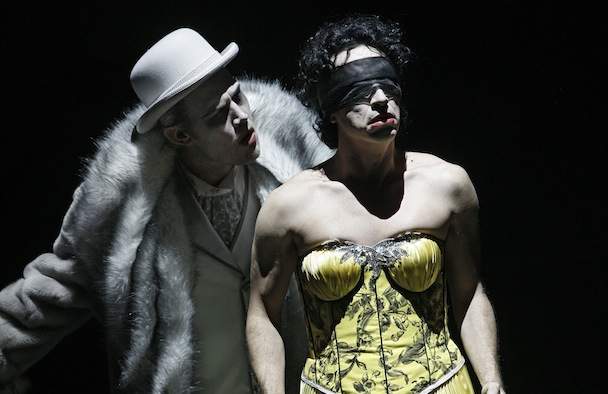The Threepenny Opera
Mack the Knife's 19th-century underworld has been updated to Cabramatta, Chippendale and the Cross.
Overview
It has been over 80 years since The Threepenny Opera premiered in Berlin, and as the murderous deviant Macheath or Mack the Knife as he's known on the streets might drawl, it's been staged in a lot of dives since. Now it's carving up a new season at the cavernous Sydney Theatre, where Mack's 19th-century underworld has been updated to Cabramatta, Chippendale and the Cross.
The production opens with a spotlit noose slowly rising out of view, making it clear from the start that the amoral antihero will wind up in the gallows. But Mack will sing before he swings, and ricochet wildly between the whorehouse and the jailhouse. It's not such a bad life for a good-time gangster in a world where thugs, whores, beggars, ladies and lawmakers are all motivated by the same carnal needs and primal instincts.
Michael Kantor's adaptation of The Threepenny Opera works so well because he plays on our 21st-century tendency to glamorise criminals and clamour compulsively over shows like Underbelly and The Sopranos. Written by Bertolt Brecht and Kurt Weill in 1928 and nominally set in Dickensian London, it's the story of how Mack the Knife challenges the supremacy of the perfidious Peachum, the Beggar King, and his empire of arrant exploitation when he woos Peachum's prized daughter, Polly. The pugilistic cast of thieves, whores and pimps proceed to either screw or screw over Mack or both during the gangster's downward spiral of doomed hedonism. The play is equal parts political satire, social parody and poetic balladry.
Mack's charisma is rooted in his roguery, and Kantor links his gutter glory to the glamorised villainy of celebrity criminals today. His production takes place within a giant boxing ring, complete with preening ring-girl, boxing bell and song placards which put into practice the Brechtian principle that every scene must be a play onto itself. Kantor slits open Sydney's well-documented history of corruption and vice with specific references to Sydney's seedier suburbs that are guaranteed to make any harboursider squirm. Peppering his production with references to real-life public figures and present-day political scandals does seem like a cheap, almost tabloid, trick at times, but for the most part Kantor succeeds impressively in re-setting this sordid story. Mack’s society, like today's, has been constructed by excess, lust and hyper-consumption; the consequences of our social pretensions are served up on a blood-reddened stage.
The play's blackly savage ballads dramatise the shameful but undeniable appeal of Mack, the bourgeois bogeyman whose rampant narcissism reflects our own. The primary purpose of Brecht's theatre of alienation was to achieve political change through social satire and dramatic exposure of corruption, and The Threepenny Opera resonates powerfully at a time when corruption and vice is still rife. It's cutting-edge theatre in every sense.







